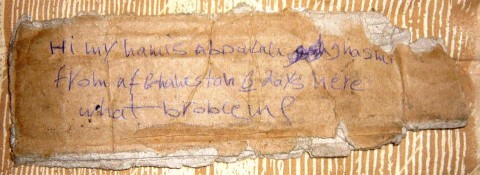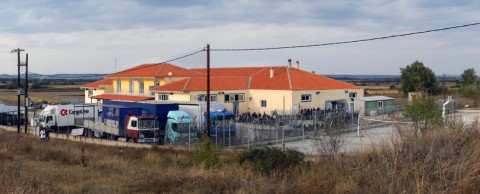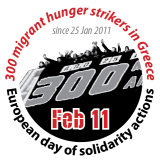Additionally to the Exhibition “Traces … from Lesvos through Europe” a Kalender for the year 2011:
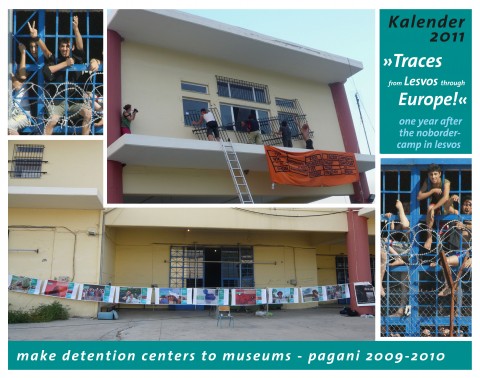
the border is the problem…
17 / 18 December 2010
download report as PDF: Short visit to Hungary_12.2010
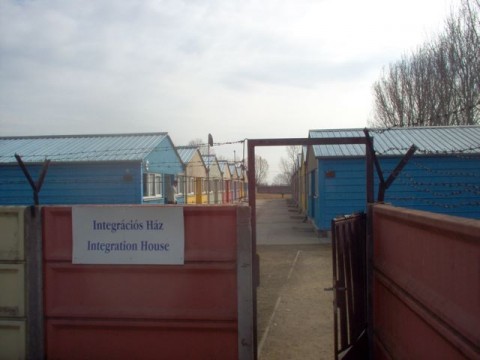 Refugeecamp in Debrecen/ Hungary
Refugeecamp in Debrecen/ Hungary
The following report refers to conversations during a two-day visit to Hungary. Predominantly, we talked to Afghan refugees in Debrecen (reception centre – transfers after the first screening in Békéscsaba or after the end of detention in one of the various detention centres) and in Bicske (camp for unaccompanied minors and recognised refugees), but also to staff of the Hungarian Helsinki Committee. The focus of these conversations was the situation of refugees, deported to Hungary under the Dublin II Regulation – but also the social conditions of refugees in Hungary in general. This was not the first visit to Hungary in which members of the Welcome to Europe Network participated: As a result of the Border Monitoring Project Ukraine (http://bordermonitoring-ukraine.eu/), there have been good contacts also to Hungary for more than two years now. And the Infomobile which has been touring Greece since the summer (http://infomobile.w2eu.net/) also stopped in Hungary on its first tour this summer. So on this trip we made some new contacts, refreshed old ones and met some known faces – and we will certainly come back…
Continue reading ‘Short visit to Hungary: Budapest – Debrecen – Bicske’
The Migrant Solidarity Network in Istanbul is calling for a demonstration on Saturday, the 8th of January in Istanbul, concerning the increasing militarisation of the borders around Turkey. Issues are the to be established Turkish border agency as well as the announcement by the Greek government to build a fence at the land border between Turkey and Greece.
Saturday, 8th of January 2010, 14:00, Galatasaray Square.
Update
Here is a video from the action. Our friends write:
The meeting on Saturday was attended by about 30-35 people. Interestingly enough the attendance of the press was quite impressive. The protest appeared on many mainstream media outlets, paper and virtual.
Here is the call in Turkish:
Continue reading ‘Protest in Istanbul [1 Update]’
On Sunday, 19 December 2010, 12 iranian refugees were arrested by turkish police forces after protests in front of UNHCR’s offices in Ankara. The demonstration was held in order to denounce the refugee agency’s violation of the rights of asylum-seekers in Turkey and was part of an international campaign coordinated by the International Coalition for the Rights of Iranian Refugees (ICRIR).
The refugees’ list of accusations against UNHCR is long. In a call for joint international protests against refugees’ situation in Turkey, ICRIR representatives proclaim deep concern about unprofessional and criminalizing treatment by UNHCR staff, long waiting periods for recognition as refugees, untenable living conditions for asylum-seekers, insufficient protection against violence and abuse by both turkish police and iranian secret agents as well as denial of official refugee status without cause.
Continue reading ‘Iranian refugees arrested during protests against UNHCR in Turkey’
from afghanistan 6 days here what the broblem?
asks young Hamis Abdalah Ghasmi from Afghanistan on a piece of cardboard that was slipped to our delegation in Fylakio. And indeed, it is the question all migrants in detention in the Evros region have in mind: Why am I being kept here?
Yesterday, i.e. Saturday, the 18th of December 2010, saw a mobilisation from the Greek antiracist movement to the Evros region, where most of the border crossings happened the last months and where many hundreds of migrants are being detained under comparably horrible circumstances as in the infamous prison of Pagani.
Frontex annouced that a decision has been signed to extend the RABITs Joint Operation 2010 in Greece until March 2011. The RABIT Teams have been deployed at the Greek-Turkish land border since the 2nd of November and initially were to stay for two month.
Besides the European Commission provides an additional package of €9.8 million to Greece for further technical support on asylum and border issues.
Our friends from Clandestina alert us to the fact that…
…last Tuesday (4th of December), a riot broke out, one of the most serious to date, at the detention centre at Fylakion in the Evros region, near the town of Orestiada and the FRONTEX headquarters at the Greco-Turkish border. According to the policemen guarding the centre, the sans papiers immigrants short-circuited the electricity network causing a blackout, blocked the sewer system causing the overflow of waste and caused minor damages to the centre’s building.
Special police forces were called in from Orestiada and the sans papiers welcomed them by throwing chlorine detergent at them. They had been supplied bottles of chlorine so that they keep the prison clean by themselves, since no cleaning service is provided for the 3-year old detention centre, where up to 1000 refugees, including families with small children, are being held in a building designed to temporarily host 350 people at a time – with bad water, few toilets, no showers, and no medical or legal help.
During the riot, four sans papiers are said to have escaped.
picture credit: image of Fylakio detention centre taken from wikipedia
Iranian refugees detained in Evros continue wave of hunger strikes
27th November, Athens, by Infomobile
Four Iranians detained at the border station of Feres in northeastern Greece have sewed their mouths in protest of their prolonged detention. Only one of them, a journalist, managed to apply for asylum. The situation in Feres is critical due to overcrowded cells but also because victims of torture, asylum seekers and other vulnerable groups are held for long periods in detention.
In the beginning of October two Iranian refugees started a hunger strike while being in detention in Evros. They stitched their mouths using fibbers from their shoelaces as an act of protest against their deportation and for their right to political asylum. If they wouldn’t had been in a critical medical condition, which led to their transfer to Alexandroupolis hospital, their cases would not have reached the public. They would have been possibly deported back to Iran where they would face imprisonment and execution for political reasons.
Since the early summer of 2010 more and more refugees – mainly coming from Iran – are caught up in the midst of a protection gap. They resorted to hunger strikes as act of political resistance, their last means of struggle, the only way to be heard and helped. Repeatedly they have fought for their right to asylum, some of them succeeded. They also fight for their freedom and basic human rights.
Continue reading ‘How the Rabit saved the refugee’
…in Greece within the last year:
by Infomobile
- 19th September – 22nd October 2009:
After a number of revolts inside the detention centre Pagani on Lesvos island, the prison was finally officially closed and the last refugees left to Athens. Huge numbers of refugees had been imprisoned in the overcrowded prison all over the summer, leading to repeated uprisings. The refugees demanded freedom through hunger strikes, broke the doors of the cells and put the cells on fire. The revolts gained a lot of public attention and media coverage through the noborder action Lesvos 2009. - 3rd February 2010:
Refugees detained in Venna put fire on their clothes and mattresses to protest against their prolonged imprisonment and the inhuman detention conditions. Only three days later 42 of them were judged penalties of 4-6 months detention and following deportation without having any access to lawyers and interpreters. Then they were transferred to other prisons in order to isolate them. - 13th March:
In the night of 13th March 2010, 35 detainees set the detention centre of the police station of Patras on fire to protest against their detention and the detention conditions. -
13th–17th April:
124 detained refugees started a hunger strike in the detention centre of Samos protesting against the transfer of 60 refugees from Samos detention centre to a prison close to the Bulgarian border and to protest against their deportation
Continue reading ‘Short history of hunger strikes by refugees’
On Saturday afternoon, 27th of November, a 24 years old afghan refugee, father of three children, was crushed between two trucks during his effort to climb in one of them and leave for Italy. This happened in the national road Patras-Korinthos (in Greece).
According to the Group for solidarity to refugees and immigrants the 24 year old man together with other afghan refugees was trying to enter a truck while it was stopped in front of a traffic light. Behind it there was another truck and its driver tried to push away the refugees by honking and approached the truck in front of him. The afghan man did not manage to escape and was severely injured. He was transferred to the hospital of Patras where he passed away 5 hours later. The police characterized the incident as a slight accident and the driver was released instead of standing trial.
Today (29th of November) in the afternoon there will be a demonstration at the central square of Patras against this decision.
A lot of refugees try to climb and hide in trucks at the port of Patras that are leaving for ports in Italy. Some of the refugees die of suffocation inside the boat, others suffer accidents like the one stated before.
As long as the borders are closed, there will be people dying during their effort to cross them. Dublin regulation must be abolished and European borders must open.
